CIA Sponsored Terror, Civil Liberties, Gaza, Habeas Corpus, Human Rights, NSA Spying, Surveillance, Targeting Muslims, Truth to Power
Podcast: Play in new window | Download


A Good American
Weeks before the September 11 attacks, newly-arrived NSA director General Michael Hayden nixed a highly-effective computer surveillance program called ThinThread. Hayden instead elected to award a $280 million contract to the private Science Applications International Corporation to develop Trailblazer, a program that ultimately cost billions of dollars and that was deemed by anonymous NSA sources as a “wasteful failure” before it was finally abandoned.
A new film by Austrian director Freidrich Moser, “A Good American,” tells the story of the mathematician many consider the best code-breaker the US ever had and how he and a small team within the NSA created ThinThread. It could pick up any electronic signal on Earth, filter for terrorist activity, and render results in real-time, avoiding data overload which has been an life-threatening impediment to national intelligence agencies. ThinThread protected American’s privacy by using an anonymizer so that identities were only revealed after obtaining a court warrant. In a secret test-run in early 2002 of the ThinThread against the pre-9/11-NSA database, the program quickly detected the terrorists’ plans.
Guest – Freidrich Moser, Friedrich holds a university degree (MA) in history and german studies from the University of Salzburg Austria. Friedrich started his professional career as a TV journalist and editor in Bolzano-Bozen Italy. In 2001 he founded blue+green communication. He has made over 20 documentaries most of them as producer director DoP. In 2008 he attended successfully the Documentary Campus, the European Masterschool for non-fiction filmmaking.
—–
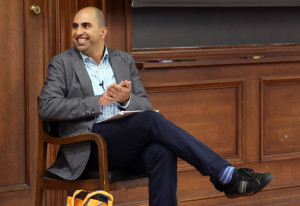

Academic Freedom Case Victory Bittersweet: University of Illinois To Pay $875,000 Settlement To Professor Steven Salaita
University of Illinois trustees have voted to agree to a $875,000 financial settlement with Steven Salaita. Last year, his job offer for a tenured position at the University of Illinois at Urbana-Champaign was withdrawn after he posted tweets harshly critical of the 2014 Israeli assault on Gaza. Under the terms of the settlement, Salaita will not get his job back but will receive $600,000. The rest of the money will go to his legal team. “This settlement is a vindication for me, but more importantly, it is a victory for academic freedom and the First Amendment,” Salaita said in a statement. “The petitions, demonstrations, and investigations, as well as the legal case, have reinvigorated American higher education as a place of critical thinking and rigorous debate, and I am deeply grateful to all who have spoken out.” .
Guest – Maria LaHood – Deputy Legal Director at the Center for Constitutional Rights with expertise in constitutional rights and international human rights. She works to defend the constitutional rights of Palestinian human rights advocates in the United States in cases such as Davis v. Cox, defending Olympia Food Co-op board members for boycotting Israeli goods; Salaita v. Kennedy,representing Steven Salaita, who was terminated from a tenured position for tweets critical of Israel; and CCR v. DOD, seeking U.S. government records under the Freedom of Information Act (FOIA) regarding Israel’s 2010 attack on the flotilla to Gaza. She works closely with Palestine Legal to support students and others whose speech is being suppressed for their Palestine advocacy around the country. She also works on the Right to Heal initiative with Iraqi civil society and Iraq Veterans seeking accountability for the lasting health effects of the Iraq war.
Guest – Anan Swaminathan– joined Loevy & Loevy in 2010. Anand has worked on a broad range of constitutional and civil rights cases, and has worked extensively on False Claims Act litigation, where he has represented whistleblowers alleging defense/military and other government contractor fraud, bid-rigging, Medicare and Medicaid fraud, construction/contractor (MBE/DBE) fraud, and tax fraud. Anand has also represented whistleblowers in financial fraud cases under the Dodd-Frank financial reform bill, and in complex fraud cases under other federal and state statutes.
—-
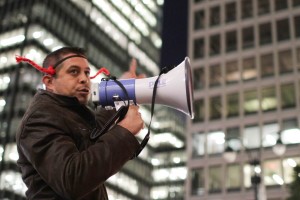
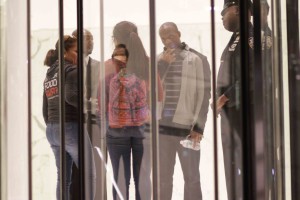
CIW Farmworkers Protest Wendy’s Board Chairman Nelson Peltz
We caught up with the Coalition of Immokalee Workers protest in front of the Wendy’s fast food restaurant in midtown Manhattan and spoke with Gerardo Reyes Chávez. Gerardo has worked in the fields since age 11, first as a peasant farmer in Zacatecas, Mexico, and then in the fields of Florida picking oranges, tomatoes, and watermelons. He joined the Coalition of Immokalee Workers, a Florida-based human rights organization, shortly after his arrival in the United States in 2000, when his fellow farm worker roommates, who had previously escaped a violent slavery operation hidden in the swamp south of Immokalee, Florida, invited him to come to the CIW’s Wednesday evening community meetings.
We also spoke with a Rabbi Raphael Kohntraster with T’ruah, a major Jewish ally of the Coalition of Immokalee Workers, inspiring Jewish communities around the country to join and support the human rights of farmworkers and call on grocery stores and restaurant chains to sign onto the Fair Food Program.
(photo credit: Jake Ratner)
————————————————————-
CIA Sponsored Terror, Civil Liberties, Criminalizing Dissent, Gaza, Human Rights, Iran, NSA Spying, Torture, War Resister
Podcast: Play in new window | Download
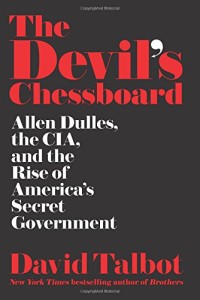
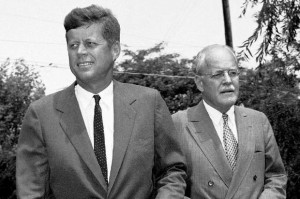
The Devil’s Chessboard: Allen Dulles, the CIA, and the Rise of America’s Secret Government
As director of the CIA, from 1952 until Kennedy fired him, Allen Dulles has been said to exemplify unbridled authority at the height of the Cold War. Under his leadership the CIA became a lawless force domestically and internationally that engaged, with impunity, in covert acts such as the assassination of foreign leaders including Patrice Lumubo in the Congo and Jacobo Arbenz in Guatemala and the over throw of a number of foreign governments.
As an attorney for the law firm Sullivan and Cromwell in the 1930s, Dulles protected and promoted Nazi-controlled cartels. He wielded his influence in the Office of Strategic Services during World War II and then in the CIA to shield former Nazis from prosecution for war crimes in the ’40s and ’50s. David Talbot writes in book The Devil’s Chessboard, ” over the final months of the JFK presidency, a clear consensus took shape within the American “deep state” Kennedy was a national security threat. For the good of the country he must be removed and Dulles was the only man with the stature, connections and decisive will to make something of this enormity happen. so he could enlist them to fight communists. In addition to assisting with the assassination of Congo leader Patrice Lumumba, he organized the Bay of Pigs invasion and tried repeatedly to murder Fidel Castro.
Guest – David Talbot, the author of the New York Times bestseller Brothers: The Hidden History of the Kennedy Years and the acclaimed national bestseller Season of the Witch: Enchantment, Terror, and Deliverance in the City of Love. He is the founder and former editor in chief of Salon, and was a senior editor at Mother Jones and the features editor at the San Francisco Examiner. He has written for The New Yorker, Rolling Stone, Time, The Guardian, and other major publications. Talbot lives in San Francisco, California.
—-
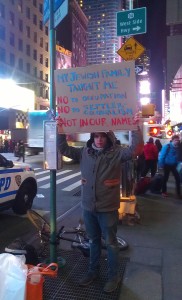

Palestinian Uprising And The Growing BDS Movement
This past October more than 49 Palestinians were shot dead by Israeli occupation forces while 500 others were injured by live ammunition and thousands more injured. As a mass popular rebellion, often attracting tens of thousands of Palestinians, asserts its right to self-determination and freedom, Israel has escalated a brutal response, especially in occupied East Jerusalem.
The Palestinian BDS National Committee, a diverse coalition of Palestinian unions and organizations which leads the global BDS movement, recently called for a wave of BDS solidarity with Palestinian popular resistance and to pressure governments, institutions and businesses to end support for Israel’s violations of international law. Tens of thousands of people across 100 cities took to the streets to show Israel that it will be held to account for its crimes against the Palestinians. Despite this, mainstream media coverage remains for the most part biased, echoing Israel’s propaganda.
Guest – Rebecca Vilkomerson, the Executive Director of Jewish Voice for Peace. JVP is a national grassroots organization rooted in Jewish tradition, human rights, and international law that works for a just peace, self-determination and full equality for all people of Palestine and Israel.
—————————————-
Civil Liberties, Criminalizing Dissent, Gaza, Human Rights, Surveillance, Targeting Muslims, War Resister
Podcast: Play in new window | Download

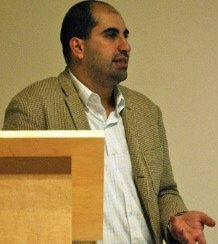
Professor Steven Salaita Case Moves Forward In Federal Court: First Amendment and Due Process Violations Upheld
There was a major federal court victory in Illinois on the Professor Steven Salaita case last week. Federal judge Harry Daniel Leinenweber ruled that the university had failed in its attempt to get Salaita thrown out of court. He upheld Salaita’s allegations that his First Amendment rights were violated. He upheld Salaita’s allegations that his due process rights were violated. He upheld his allegations that he had a contract and he said this case has to proceed to discovery and I’m not going to throw it out at this point. The judge took a very strong position with respect to both the contract and freedom of speech. It looks like the University of Illinois is on a losing path. The day after the decision came down, Chancellor Wise who was one of people responsible for firing Professor Steven Salaita, resigned from her job.
Guest – Maria LaHood, Deputy Legal Director at the Center for Constitutional Rights with expertise in constitutional rights and international human rights. She works to defend the constitutional rights of Palestinian human rights advocates in the United States in cases such as Davis v. Cox, defending Olympia Food Co-op board members for boycotting Israeli goods; Salaita v. Kennedy,representing Steven Salaita, who was terminated from a tenured position for tweets critical of Israel; and CCR v. DOD, seeking U.S. government records under the Freedom of Information Act (FOIA) regarding Israel’s 2010 attack on the flotilla to Gaza. She works closely with Palestine Legal to support students and others whose speech is being suppressed for their Palestine advocacy around the country.
—–
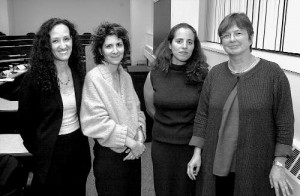
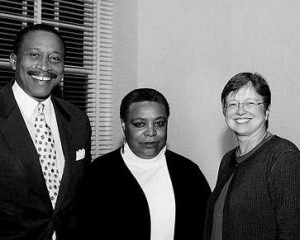
Lawyers You’ll Like: Professor Holly Maguigan
In our Lawyers You’ll Like series we’re joined by Professor Holly Maguigan, Professor of Clinical Law at the New York University School of Law, where she teaches Comparative Criminal Justice Clinic: Focus on Domestic Violence and Evidence. Professor Maguigan is an expert on the criminal trials of battered women. Her research and teaching is interdisciplinary. Professor Maguigan is a member of the Family Violence Prevention Fund’s National Advisory Committee on Cultural Considerations in Domestic Violence cases. She serves on the boards of directors of the National Clearinghouse for the Defense of Battered Women and the William Moses Kunstler Fund for Racial Justice. She is a past co-president of the Society of American Law Teachers, the largest membership organization of law professors in the U.S.
Professor Holly Maguigan:
- I was doing medieval history and I was at Berkeley. It was 1967 and Oakland stopped the draft.
- I got very interested in the anti-war politics.
- I hated lawyers. I really hated lawyers. They were boring. They talked about themselves all the time. They only had stories about their cases and how great they were and they would never post bail when people got arrested.
- The University of Pennsylvania in Philadelphia is where I stayed for 17 years.
- First I started out as a public defender. I loved being a public defender, it was the beginning and end of everything I hoped it would be.
- That’s where I met David Rudovsky and David Kairys. They were then defenders while I was a student.
- After they went out on their own, they kept inviting me to join them. I kept putting it off because I loved being a defender so much.
- In Philadelphia there was much more actual litigation, not just motion litigation there’s a lot of that here in New York City but actual trials.
- You had a sense, there was an analysis that people were doing life on the installment plan and you needed to do what you could to kick them loose any particular time.
- It was a community in its own odd way and I found it difficult to leave it.
- I was doing major felonies within a couple of years.
- David Kairys was very focused on constitutional litigation and government misconduct. He did the Camden 28 which was a big draft resistance case.
- My interest was more into criminal defense.
- Grand juries (all over the country) convened to investigate the alleged transportation of Patty Hearst by the SLA from California where she had been captured.
- He was a killer. (Frank Rizzo) There was no question. More people died in police actions before or since.
- I don’t mean to suggest that all the police started out as homocidal. This was a situation which from the top down came the message if you’re a good cop then you’re going to take people out however you think you need to.
- I knew about race and class bias in the court room as much as a white woman who was middle class could know.
- I was just blown away by what happens when you add hatred of women to hatred of black people and hatred of poor people.
- Judges would go by me in the hall and say Maguigan, ahem, you didn’t give me anything this Christmas, not even one lousy bottle, you’re not getting any assignments.
- Judges would do things, like open the drawer in their chambers, and there would be wads of bills, and they’d let you know.
- I developed a specialty on women who kill men.
- In the early eighties a group in Philadelphia called Women Against Abuse began working and they did advocacy for battered women accused of crime and meant a huge difference.
- The battered women cases I was working on were quite consuming because people then didn’t know very much in how to try these cases.
- The judges expected you to plead insanity or guilty. Reasonable doubt was a consideration at sentencing not at trial.
- There were cases that did require teams. There was no question.
- I wanted to be in court. I wanted to be in the presence of that conflict between the authorities and regular people.
- I went to NYU where I taught in the criminal defense clinic for many years.
- To see students react to the great stories their clients have is just amazing.
- SALT (Society of American Law Teachers) is about who gets into law school, what they learn and who teaches them. It’s about access to justice. It’s about relating to law school as a place where you train people to do social justice. SALT’s focus is on students and teaching.
- Holly Maguigan to be honored by Society of American Law Teachers.
Guest – Professor Holly Maguigan teaches a criminal defense clinic and one in comparative criminal justice as well as a seminar in global public service lawyering and a course in evidence. She is an expert on the criminal trials of battered women. Her research and teaching are interdisciplinary. Of particular importance in her litigation and scholarship are the obstacles to fair trials experienced by people accused of crimes who are not part of the dominant culture. Professor Maguigan is a member of the Family Violence Prevention Fund’s National Advisory Committee on Cultural Considerations in Domestic Violence cases. She serves on the boards of directors of the National Clearinghouse for the Defense of Battered Women and the William Moses Kunstler Fund for Racial Justice. She is a past co-president of the Society of American Law Teachers, the largest membership organization of law professors in the U.S.
————————————-
Censorship, CIA Sponsored Terror, Civil Liberties, Criminalizing Dissent, Crony Capitalism, FBI Intrusion, Gaza, Human Rights, NSA Spying, Political Prisoner, Prosecution of the Bush Administration, Surveillance, Targeting Muslims, Truth to Power
Podcast: Play in new window | Download
Updates:
—-
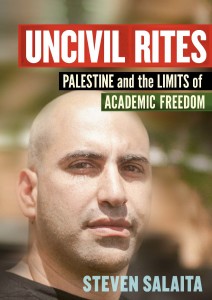
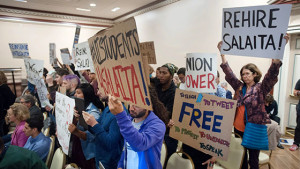
Steven Salaita Hired by American University of Beirut
In what we can view as a major victory for supporters of Palestinian human rights fired Professor Steven Salaita has been hired at the American University in Beirut in the American Studies Department. The American Association of University Professors calls Steven Salaita’s firing one of the significant violations of academic freedom in this decade. Nationwide over 5000 academics pledged to boycott the university resulting in the cancellation of dozens of scheduled talks and conferences at the University of Illinois. The University of Illinois’ action was part of a broader campus crackdown on Palestinian human rights activism that threatens both the foundational role of the university as a place of critical thinking and debate and the ability to advocate for Palestinian rights.
Guest – Professor Steven Salaita, former associate professor of English at Virginia Tech. He is the author of six books and writes frequently about Arab Americans, Palestine, Indigenous Peoples, and decolonization. His current book project is entitled Images of Arabs and Muslims in the Age of Obama.Steven grew up in Bluefield, Virginia, to a mother from Nicaragua (by way of Palestine) and a father from Madaba, Jordan. Books by Salaita, his upcoming book is titled Uncivil Rights and The Limits Of Academic Freedom by Haymarket Press.
—-
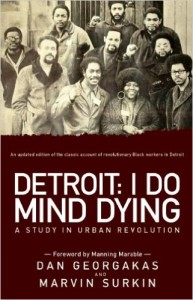
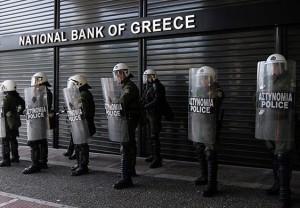
Greece Economic Crisis 2015 Update
Earlier this year we spoke with regular columnist for the National Herald Dan Georgakas about the historic election as the people of Greece voted in the anti-austerity party of Syriza, led by Alexis Tsipiras winning a 149 seats of the 300 seat Parliament. Today, the economic and political state in Greece is in a tremendous state of flux. Will Greece leave the EU and the Eurozone? Will its debt be written down and restructured?
Guest – Dan Georgakas, regular columnist for the National Herald, the leading Greek American weekly newspapero co-author of Detroit: I Do Mind Dying and coeditor of Solidarity Forever: An Oral History of the IWW. He was a frequent contributor to now defunct Journal of the Hellenic Diaspora and the Journal of Modern Hellenism. Dan has taught at NYU, CUNY, Van Arsdale Labor College, Columbia University and University of Oklahoma.
—————————————-
Civil Liberties, Criminalizing Dissent, Gaza, Human Rights, NSA Spying, Political Prisoner, Prison Industry, Targeting Muslims, Torture
Podcast: Play in new window | Download
Updates:
—-

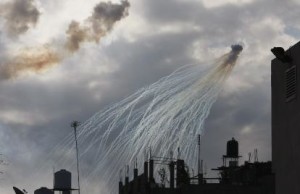
UN Human Rights Report Finds Israel Committed War Crimes and Unprecedented Devastation in 2014 Gaza War
Recently the United Nations issued a report on Israel’s attack on Gaza in the summer of 2014. The results were devastating again for Israel. The report also covered illegal Israeli settlements as well as house demolitions. Another section dealt with rockets that came from Gaza and went into Israel. What can we expect the result of this report to be? Will it be like the other ones, simply good reading or bad reading and shelved again? Will the UN act to do something with it? Will it go to the International Criminal Court? Again, we don’t know.
Guest – Diana Buttu, a Palestinian-Canadian lawyer and a former spokesperson for the Palestine Liberation Organization. Best known for her work as a legal adviser and a participant in peace negotiations between Israeli and Palestinian organizations, she has since been associated with Stanford University, Harvard University, and the Institute for Middle East Understanding (IMEU).
—-
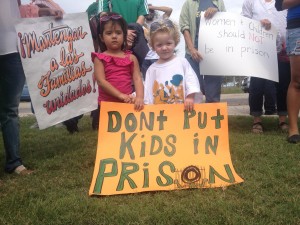

ICE Detention Center Standards Improve, Being Released is Now More Difficult
When women and children from Central America seek asylum and are captured at the US border, some are arrested and sent to a detention center in Artesia, New Mexico. Run by Immigration and Customs Enforcement, there are no legal services providers in the state funded to represent persons in detention. The Obama administration has made clear that immigrants’ cases must be processed as quickly as possible, and that most should be deported, increasing the likelihood that detainees are deprived the chance to exercise their rights.
To help ensure that women in detention get legal help in navigating a complex and difficult-to-understand process, a small group of volunteer attorneys organized by the American Immigration Lawyers Association works at the center 12 hours a day. The court process in Artesia has been described as a “s#%*show” where judges refuse to let lawyers speak during hearings, detainees clearly worthy of asylum are denied, and no one will articulate the legal basis for judges and asylum officers’ decisions. Most women in detention do not understand that they can ask for time to locate an attorney or that they cannot be deported without having an opportunity to present their case.
Guest – Attorney Laura Lichter, former president of the American Immigration Lawyers Association. (“AILA”), the premier bar association of immigration lawyers and law professors in the U.S. She has been an elected member of AILA’s national leadership for over a decade and has served as the association’s top liaison to the key immigration enforcement bureaus of the Department of Homeland Security and Department of Justice, including Immigration and Customs Enforcement (ICE), which is responsible for immigration investigations, prosecution, detention and removal operations, and the Executive Office of Immigration Review (EOIR), which oversees the nation’s immigration court system. Ms. Lichter is AILA’s liaison to the American Bar Association’s Commission on Immigration and serves on the Federal Bar Association’s Immigration Law Section Advisory Board. Ms. Lichter recently served on the Homeland Security Advisory Council (HSAC) Task Force on ICE’s Secure Communities program, reporting to findings on the ICE enforcement initiative to DHS Secretary Napolitano. Based in Denver, she is the former Chair of AILA’s Colorado Chapter. Ms. Lichter’s practice focuses on the representation of foreign nationals in removal proceedings, contested family and naturalization applications, administrative appeals, and related federal district and appellate court litigation.
——————————————–
CIA Sponsored Terror, Civil Liberties, Criminalizing Dissent, Gaza, Habeas Corpus, Human Rights, Political Prisoner, Prosecution of the Bush Administration, Supreme Court, Targeting Muslims
Podcast: Play in new window | Download
Updates
- Michael Ratner Update: Iraqi Woman Sues Bush Administration for Illegal Iraq War
- Remembering Ronnie Gilbert from The Weavers
—-

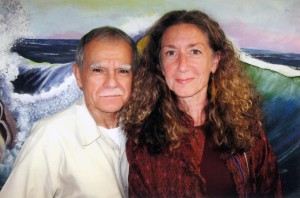
The Campaign To Free Oscar Lopez Riviera
There’s been a long struggle by Puerto Ricans here in the United States for the independence of their native land Puerto Rico. Oscar Lopez Riviera was one of these people. He was framed up on the political charge of seditious conspiracy and has been in prison since the 1980s. All his co-defendants in the original trial have now been freed but he remains locked up and there is a campaign going on in the United States right now to free Oscar Lopez Riviera.
Guest – Attorney Jan Susler joined People’s Law Office in 1982 after working for six years as a Clinical Law Professor at the legal clinic at Southern Illinois University’s School of Law, Prison Legal Aid. At the People’s Law Office she continued her litigation and advocacy work on prisoners’ rights issues and also took on representing people wrongfully imprisoned, falsely arrested, strip searched, or subjected to excessive force by police officers.
Her long history of work on behalf of political prisoners and prisoners’ rights includes litigation, advocacy and educational work around federal and state control unit prisons in the U.S. Her work with the Puerto Rican Independence Movement and with progressive movements challenging U.S. foreign and domestic policies has been a constant throughout her 36 years as a lawyer. She was an adjunct professor of criminal justice at Northeastern Illinois University, and taught constitutional law at the University of Puerto Rico. For over three decades she has represented Puerto Rican political prisoners, and she served as lead counsel in the efforts culminating in the 1999 presidential commutation of their sentences. She continues to represent those who remain imprisoned.
—–
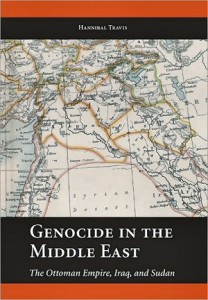

Genocide In The Middle East, The Ottoman Empire, Iraq and Sudan
Here on Law and Disorder we’ve discussed genocide. Genocide of course, we’ve most recently discussed with our co-host whose family was effected by the Armenian genocide, we’ve discussed that genocide. We’ve also discussed the question of whether what has happened to Palestinians the Middle East also constitutes as genocide.
Guest – Hannibal Travis teaches and conducts research in the fields of cyberlaw, intellectual property, antitrust, international and comparative law, and human rights. He joined FIU after several years practicing intellectual property and Internet law at O’Melveny & Myers in San Francisco, California, and at Debevoise & Plimpton in New York. He has also served as Visiting Associate Professor of Law at Villanova University, and a Visiting Fellow at Oxford. He graduated summa cum laude in philosophy from Washington University, where he was named to Phi Beta Kappa. He graduated magna cum laude from Harvard Law School, where he served as a member of the Harvard Journal of Law and Technology and the Harvard Human Rights Journal, and as a teaching assistant in Harvard College. After law school, Professor Travis clerked for the United States District Court in Los Angeles, California. Professor Travis has published articles on copyright, trademark, and antitrust law in the Berkeley Technology Law Journal, Hofstra Law Review, the Journal of the Copyright Society of the USA, Notre Dame Law Review, Pepperdine Law Review, University of Miami Law Review, Vanderbilt Journal of Entertainment and Technology Law, Virginia Journal of Law and Technology, and Yale Journal of Law and Technology.
———————————————

























